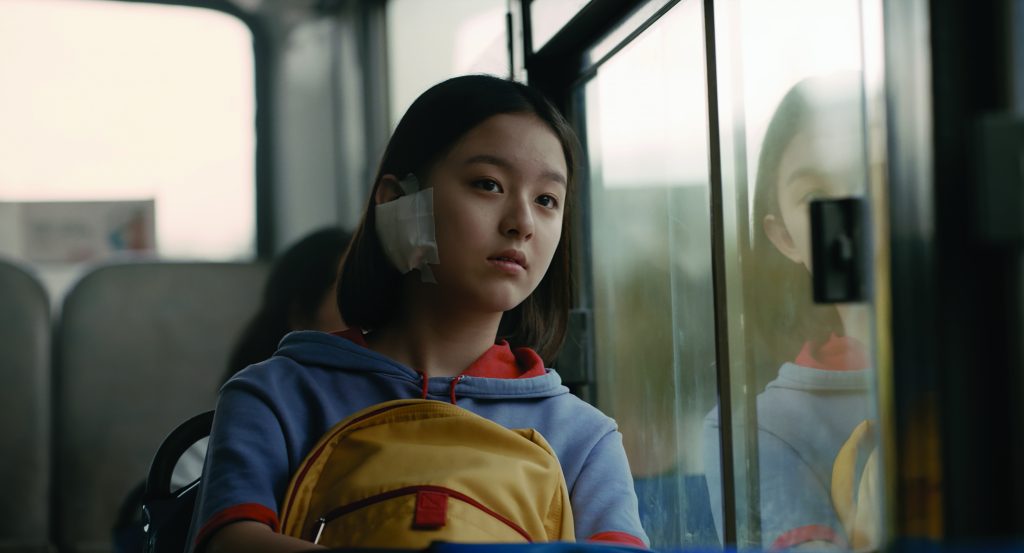May 5, 2019
by Carla Hay

“House of Hummingbird” (“Beol-sae”)
Directed by Bora Kim
Korean with subtitles
North American premiere at the Tribeca Film Festival in New York City on April 27, 2019.
Very few feature films can be praised as accurately depicting the angst of being a 13-year-old girl. Bo Burnham’s 2018 comedy “Eighth Grade” is one of them. Catherine Hardwicke’s 2003 dark drama “Thirteen” is another. And here’s another to add to the list: writer/director Bora Kim’s beautifully made, introspective feature-film debut “House of Hummingbird,” a semi-autobiographical drama set in 1994 Seoul, South Korea. “House of Hummingbird” does not have the social-media-driven humor of “Eighth Grade” or the dangerous, self-destructive behavior of “Thirteen,” but it conveys a similar spirit that shows how feelings of insecurity and social pressures can eat away at a young girl’s confidence. Carried by an admirable performance by Jihu Park, “House of Hummingbird” is a deliberately paced film that builds up to a conclusion that transforms several of the characters in the story.
Being a 13-year-old in eighth grade is a tricky age for a girl. She’s going through puberty, and might be thinking about dating—but, depending on her family and peers, she might be considered too young to date people her age. She’s old enough to go to places without adult supervision, but she’s not old enough to drive. And 13 is an age when most people are preparing themselves for high school, which is the time in many people’s lives where they have to make decisions that impact their futures as adults.
In “House of Hummingbird,” Park portrays Eunhee, a slightly rebellious teen who loves spending time with her friends, going to karaoke bars, and occasionally getting into mischief, such as shoplifting. Her parents own a rice cake shop, and she’s sometimes made to feel socially inferior because of her family’s working-class economic status. At home in their crowded urban apartment, Eunhee is often unhappy. Her older brother Dae-Hoon (played by Son Sang-yeon), who is the favored child because he is a boy, bullies her by secretly hitting her for no good reason. Her stressed-out parents (played by Lee Seung-yeon and Jung In-gi) frequently argue with each other. And her older sister Suhee (played by Bak Su-yeon) is so passive that she tries to make herself invisible and isn’t much of a friend to Eunhee. All of the kids sometimes chip in to work at the family shop, but Eunhee doesn’t like it and thinks she can have a better life for herself. She doesn’t really know yet how she’s going to accomplish that, although she dreams of being a cartoonist.
At the cram school where Eunhee is a student, she finds an intriguing role model in a new teacher named Yong-ji (played Saebyuk Kim), who is more independent-minded than the other female teachers at the school. It’s the kind of school where a teacher will make the students chant that they won’t do karaoke and will go to Seoul University, and students are told to anonymously write down the names of other students who are being delinquent. Yong-ji encourages Eunhee to follow her dreams and to find a way to respect herself, even if the people around her don’t show Eunhee respect. As her admiration for Yong-ji grows, Eunhee finds reasons to spend time with her teacher outside of the classroom. In a letter that Eunhee writes to Yong-ji later in the movie, she asks a question that sums up her teenage feelings of uncertainty: “When will my life shine?”
Meanwhile, Eunhee tentatively gets closer to a male friend named Jiwan (played by Jeong Yun-se), and their innocent flirting turns into hand holding and then awkward experimenting with French kissing. Eunhee keeps her budding romance a secret from her family, since she doesn’t want to get in trouble for being considered too wild. Eunhee and her best friend Jisuk (played by Park Seo-yun ) get caught shoplifting, and they have a disagreement over whether or not to offer an apology to the store owner. Jisuk wants to apologize, but Eunhee does not, and the disagreement ends their friendship. During all of this personal drama, Eunhee finds out that there’s a lump on her upper neck that needs to be removed because it’s near a salivary gland. The operation might leave a scar, and there’s a chance that her face might be paralyzed.
Much of “House of Hummingbird” might be a little too slow-paced for movie audiences who are used to films about teens that have a lot of snappy dialogue and a constant stream of misadventures. “House of Hummingbird” takes a more realistic approach of showing some of the boredom that comes with being a stifled teenager. However, the last 30 minutes of this 138-minute film have a series of unforgettable events where Eunhee has a powerful awakening that she least expects, even if it comes at an emotional cost.
UPDATE: Well Go USA Entertainment will release “House of Hummingbird” in select U.S. virtual cinemas on June 26, 2020.
